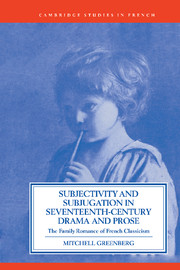 Subjectivity and Subjugation in Seventeenth-Century Drama and Prose
Subjectivity and Subjugation in Seventeenth-Century Drama and Prose Published online by Cambridge University Press: 16 October 2009
Nous n'avons point de cœur pour aimer ni haïr
Toutes nos passions ne savent qu'obéir.
(III, iii, 869–870)Traditionally Rodogune has been seen to mark a turning point in the Cornelian canon. It incorporates the lessons of the past while already indicating a new path to follow. This new direction turns out to be a detour, a sexual deviation. From here on the women become the standard bearers of the “will to power,” of the renunciation and singleness of purpose that, up until Rodogune, had been the lot of Corneille's heroes. The men are mired in metaphysical dilemmas which gradually reduce them to positions of indecision, passivity and ultimately impotence.
Rodogune stands at the crossroads of two worlds, and at this nexus of ambivalence men are unsexed and women are virilized. The essential traits defining sexual difference, the separation of the Cornelian world into the well-ordered camps of masculinity and femininity, are blurred. It is from the blurring of these “natural” positions, from their perversion, that the monstrous – of which Rodogune is perhaps the best example – is born and triumphs.
Curiously, this monstrous play is, Corneille tells us, his favorite:
On m'a souvent fait une question à la cour: quel était celui de mes poèmes que j'estimais le plus; et j'ai trouvé tous ceux qui me l'ont faite si prévenus en faveur de Cinna ou du Cid, que je n'ai jamais osé déclarer toute la tendresse que j'ai toujours eue pour celui-ci, à qui j'aurais volontiers donné mon suffrage, si je n'avais craint de manquer, en quelque sorte, au respect que je devais à ceux que je voyais pencher d'un autre côté.
(Examen, p. 350)To save this book to your Kindle, first ensure [email protected] is added to your Approved Personal Document E-mail List under your Personal Document Settings on the Manage Your Content and Devices page of your Amazon account. Then enter the ‘name’ part of your Kindle email address below. Find out more about saving to your Kindle.
Note you can select to save to either the @free.kindle.com or @kindle.com variations. ‘@free.kindle.com’ emails are free but can only be saved to your device when it is connected to wi-fi. ‘@kindle.com’ emails can be delivered even when you are not connected to wi-fi, but note that service fees apply.
Find out more about the Kindle Personal Document Service.
To save content items to your account, please confirm that you agree to abide by our usage policies. If this is the first time you use this feature, you will be asked to authorise Cambridge Core to connect with your account. Find out more about saving content to Dropbox.
To save content items to your account, please confirm that you agree to abide by our usage policies. If this is the first time you use this feature, you will be asked to authorise Cambridge Core to connect with your account. Find out more about saving content to Google Drive.